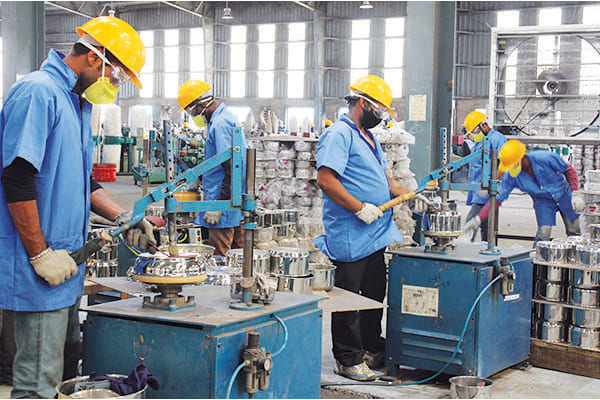
By Shobha Karandlaje
In today’s time, the world is moving rapidly towards a technological future where artificial intelligence becomes the central focal point of global narrative.
The goal of Viksit Bharat, as envisioned by our honourable Prime Minister Narendra Modi, takes into account to inspire our youth, particularly those from traditionally underrepresented groups such as SC/ST communities, women, differently-abled individuals, ex-servicemen, and economically disadvantaged citizens, to consider entrepreneurship as a viable career path.
The Entrepreneurship and Skill Development programme’s vision extends beyond mere business creation. This reflects a strategic approach to addressing unemployment while simultaneously driving economic growth and fostering innovation at the grassroots level. Along with that, there is a wave of joy in the MSME sector with the announcement of the Credit Guarantee Scheme, which offers up to Rs 100 crore in collateral-free loans for machinery, directly addressing the critical challenge of access to affordable credit and empowering businesses to invest in advanced technology and enhance their productivity. This democratization of credit is poised to benefit a vast number of small and emerging businesses. It is these businesses that will channel innovation at the root level and will provide a rapid trickle-down effect of wealth creation.
This year’s union budget introduces a crucial mechanism for providing credit support during periods of stress, backed by a government-guaranteed fund, which helps prevent businesses from becoming non-performing assets and maintains overall economic stability. The doubling of Mudra Loans to Rs. 20 lakh for entrepreneurs under the ‘Tarun’ category represents a substantial boost, enabling the scaling of businesses and fostering job creation. The enhancement of the Trade Receivables Discounting System (TReDS), with a reduced turnover threshold and expanded eligibility, improves liquidity and financial management for MSMEs. The planned expansion of SIDBI branches to all major MSME clusters within three years promises more accessible financial services, driving localized economic growth.
Furthermore, the establishment of 50 multi-product food irradiation units and 100 NABL-accredited food quality and safety testing labs will significantly boost the food processing sector, enhancing product quality and opening new market opportunities. The creation of E-Commerce Export Hubs in PPP mode is another forward-thinking initiative, enabling MSMEs and traditional artisans to access global markets more easily and driving digital transformation and international growth.
From the “First Timers” scheme, which provides a one-month salary, capped at Rs 15,000, as a direct benefit transfer to newcomers in formal employment sectors, positively impacting approximately 210 lakh young workers, to incentives for hiring new employees in the manufacturing sector, covering EPFO contributions for both employers and employees during the first four years, benefiting 30 lakh individuals.
The govt. is institutionalising safeguards and encouraging the youth to drive the engine of India’s progress with their immense potential. Along with that, employer’s welfare into account too is being taken care of, with the scheme reimbursing employers up to Rs 3,000 monthly for two years for each additional employee earning up to Rs 1 lakh per month, targeting the employment of 50 lakh new workers. The govt. is taking a concerted step by partnering with industries to set up hostels and crèches for working women, alongside specialized skill development programmes and providing market access for women-led Self-Help Group (SHG) enterprises. Inclusivity is the motto.
In the pursuit of inclusive economic growth, collaboration between industry and academia has emerged as a crucial factor, particularly in the development of MSMEs. Recognizing this importance, the Ministry of Micro, Small, and Medium Enterprises has implemented the MSME Innovative Scheme under the MSME Champions Scheme, aiming to forge stronger links between educational institutions and the MSME sector.
On the other hand, academic institutions are hubs of knowledge and innovation but sometimes lack real world application contexts. The MSME Innovative Scheme bridges this gap, creating a symbiotic relationship that benefits both sectors and, by extension, the broader economy. The scheme’s approach is multifaceted. The involvement of 697 academic institutions as Host Institutes under the incubation component is a testament to the scheme’s widespread adoption and potential impact.
One of the key focuses of this collaboration is to enhance the industrial skills of students and MSME personnel. This skill development is crucial for creating a workforce that is not only academically qualified but also industry-ready. For students, it provides invaluable exposure to real-world business challenges and opportunities. For MSMEs, it offers access to fresh perspectives and the latest academic research, potentially leading to innovative solutions for their operational challenges. As of today, we have seen a remarkable growth of 17 crore jobs in the last 10 years. To put things into perspective, employment in the country increased to 64.33 crore in the year 2023-24 compared to 47.15 crore in 2014-15 as per the data published by the Reserve Bank of India (RBI). Under the visionary leadership of Prime Minister Narendra Modi, we take giant leaps ahead towards a Bharat where Vikas reaches every household and touches the life of every soul, amalgamating the collective energy towards the ideal of being a Vishwaguru. There can be no doubt that we are headed to an era of great renaissance that would usher us into the golden age of Viksit Bharat.
(The author is Union Minister of State for Micro, Small and Medium Enterprises & Labour and Employment)



